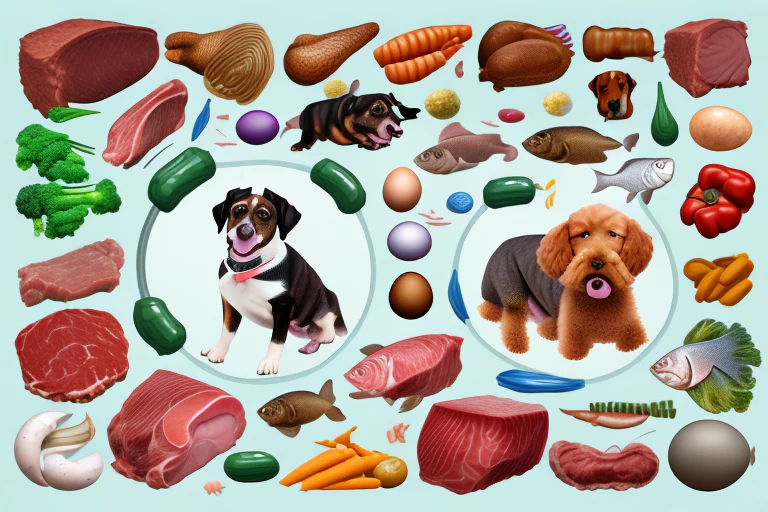“Protein is the essential foundation of life, fueling growth, repair, and overall vitality.” – Dr. Karen Becker, Holistic Veterinarian.
Understanding the vital role of protein in your dog’s diet is paramount for any pet owner aiming to ensure their furry friend’s health and longevity. Protein isn’t just a macronutrient; it’s a powerhouse that supports muscle development, maintains a healthy coat, aids in cell regeneration, and boosts the immune system. According to the American Kennel Club, a dog’s diet should consist of at least 18% protein for maintenance and up to 22% for growth and reproduction.
Why Protein Matters For Dog
Protein is composed of amino acids, which are the building blocks of your dog’s body. There are 22 amino acids, and dogs can synthesize 12 of them. The remaining 10, known as essential amino acids, must come from their diet. These include arginine, histidine, isoleucine, leucine, lysine, methionine, phenylalanine, threonine, tryptophan, and valine. Without adequate protein, dogs can suffer from malnutrition, weakened immunity, and poor muscle development.

Sources of High-Quality Protein
Not all proteins are created equal. Here are some of the best sources of high-quality protein for dogs:
- Animal Meat: Chicken, beef, turkey, and lamb are excellent sources. They provide a complete amino acid profile that is easily digestible.
- Fish: Rich in omega-3 fatty acids, fish like salmon and mackerel support skin and coat health.
- Eggs: Considered the gold standard for protein, eggs are highly digestible and packed with essential amino acids.
- Dairy Products: Yogurt and cheese can be good protein sources, but ensure your dog isn’t lactose intolerant.
- Plant-Based Proteins: Lentils, peas, and chickpeas can supplement protein intake, particularly for dogs with meat allergies.
Benefits of Adequate Protein Intake
Ensuring your dog receives enough protein has numerous benefits:
Muscle Maintenance and Growth
Protein is crucial for the development and repair of muscles. Active and growing dogs, such as puppies and working breeds, require higher protein levels to support their muscle mass and energy needs.

Healthy Skin and Coat
Proteins are integral to producing keratin, a key component of your dog’s skin and coat. A diet rich in protein leads to a shiny, healthy coat and reduces shedding.
Immune System Support
Proteins help produce antibodies and other components essential for a robust immune system. A protein-deficient diet can lead to a weakened immune response, making your dog more susceptible to infections.
Hormone and Enzyme Production
Proteins play a significant role in synthesizing hormones and enzymes that regulate various bodily functions, including metabolism and digestion.
Determining the Right Amount of Protein
The ideal protein intake depends on several factors, including your dog’s age, breed, activity level, and health status. Here’s a quick guide:

- Puppies: Require higher protein for growth – around 22-32% of their diet.
- Adult Dogs: Need maintenance-level protein – typically 18-25%.
- Senior Dogs: Protein is crucial for maintaining muscle mass, so 20-25% is recommended.
- Working or Active Dogs: Higher protein is needed to repair and build muscles – around 25-35%.
Reading Dog Food Labels
Understanding dog food labels is key to ensuring your dog gets the right protein amount. Look for these indicators:
- Guaranteed Analysis: This section shows the minimum percentage of crude protein.
- Ingredient List: Ingredients are listed by weight, so high-quality protein sources should be near the top.
- AAFCO Statement: Ensures the food meets the nutritional levels established by the Association of American Feed Control Officials.
Addressing Common Challenges
Allergies and Sensitivities
Some dogs may develop allergies to specific protein sources, such as beef or chicken. In such cases, novel proteins like venison, duck, or hypoallergenic diets might be necessary.

Obesity and Weight Management
High-protein diets can help manage weight by promoting a feeling of fullness and supporting lean muscle mass. Consult your veterinarian to balance protein intake with caloric needs.
Kidney Health Concerns
While protein is essential, excessive amounts can strain the kidneys, especially in dogs with preexisting kidney conditions. Always seek veterinary advice for tailored dietary recommendations.
Providing your dog with a balanced diet rich in high-quality protein is one of the best ways to ensure they live a healthy, active life. From supporting muscle growth to enhancing immune function, the benefits are clear. By understanding your dog’s specific needs and choosing the right protein sources, you can significantly impact their well-being and longevity.
Remember, a happy dog is a healthy dog. Tailor their diet with care and watch them thrive.





















